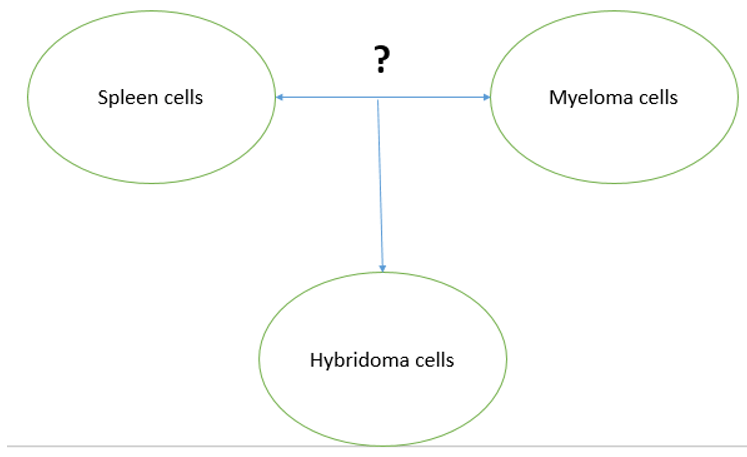This set of Pharmaceutical Biotechnology Multiple Choice Questions & Answers focuses on “Genetic Recombination – Development of Hybridoma for Monoclonal Antibodies (MABs) – 2”.
1. For which discovery did Georges Köhler and César Milstein share the noble prize in 1984?
a) Inventing genome sequencing
b) Discovery the structure of DNA
c) Discovery of B-cell cancer myeloma
d) Discovery of the process of producing monoclonal antibodies
View Answer
Explanation: The B-cell cancer myeloma was known, researchers understood that these cancerous B-cells all produce a single type of antibody. This theory was used to study the structure of antibodies. Later the process of producing monoclonal antibodies invented by Georges Köhler and César Milstein shared the Nobel Prize in Physiology or Medicine in 1984 for the discovery.
2. Which of the following will perfectly fit in the marked place?

a) Antigen
b) Cells from different organism
c) Spleen cells
d) NK cells
View Answer
Explanation: For the hybridoma technology the mouse is being injected with antigen. Antigen can be intact cell, whole cell membrane, microorganism, peptide, protein, heat killed cells. These are injected to activate the immune reaction till the making of memory cells. Which can later be harvested for the production of monoclonal antibody.
3. Which of the following will perfectly fit in the marked place?

a) PEG fusion
b) HAT medium
c) 8-Azaguanine
d) Azaguanine
View Answer
Explanation: Polyethylene glycol fusion is a simple and efficient technique widely used for monoclonal cell production. Spleen cells and myeloma cells are fused using polyethylene glycol. Then the hybridoma cells are grown in HAT selective medium and scanned for viable hybridoma cells.
4. Fight against Bioterrorism is one of the clinical applications of monoclonal antibodies.
a) True
b) False
View Answer
Explanation: Yes, bioterrorism can be fought with the help of Monoclonal antibodies. These are because bioterrorism most of the time means by certain virus, bacteria will be engaged to take down a whole place. That microbe will be having a single antibody being produced in the host cell. Thus, we can harvest these and may have a monoclonal antibody in the future.
5. Biosensors & Microarrays are diagnostic applications of monoclonal antibodies.
a) True
b) False
View Answer
Explanation: Monoclonal antibodies are employed in the manufacturing of biosensors and microarrays. Monoclonal antibodies since they are made from only one single antigen can be used to detect the presence of that antigen in the given sample. It can detect antigens in a very small amount.
6. What is the clinical application of monoclonal antibodies?
a) Biosensors
b) Transplant rejection
c) Infectious disease
d) Purification of drugs
View Answer
Explanation: Application of monoclonal antibody in the biosensors is a diagnostic application of maps. Using in transplant rejection and infectious disease is the therapeutic application of monoclonal antibodies. Purification of drugs and imaging the target is the clinical application of monoclonal antibody.
7. MAbs act directly when binding to cancer-specific antigens and induce an immunological response to cancer cells.
a) True
b) False
View Answer
Explanation: mAbs act directly when binding to cancer-specific antigens and induce an immunological response to cancer cells. Such as inducing cancer cell apoptosis, inhibiting growth, or interfering with a key function. This is one of the reasons for the application of monoclonal antibodies in the cancer treatment field.
8. MAbs was modified for delivery of a toxin, radioisotope and __________
a) Enzymes
b) Hormones
c) Drugs
d) Cytokine
View Answer
Explanation: Monoclonal antibodies are modified to deliver any toxin, radioisotope, cytokine or other active conjugates used for treatment purposes. Bispecific antibodies that can bind with their Fab regions both to the target antigen and to a conjugate or effector cell are also produced. Antibodies similar to human antibodies are produced so that they don’t suffer immune rejections.
9. Bispecific antibodies can bind with their Fab regions both to target antigen and to _____________
a) Other antibodies
b) An effector cell
c) Proteins around
d) Prostaglandins
View Answer
Explanation: It is possible to design bispecific antibodies. Bispecific antibodies can either bind to 2 antigen or bind with antigen and with another effector cell/conjugate cell. By binding with effector cell, it increases the efficacy of the reactions to happen and thus more chances of getting positive results.
Sanfoundry Global Education & Learning Series – Drug and Pharmaceutical Biotechnology.
To practice all areas of Pharmaceutical Biotechnology, here is complete set of 1000+ Multiple Choice Questions and Answers.
If you find a mistake in question / option / answer, kindly take a screenshot and email to [email protected]
- Apply for Biotechnology Internship
- Check Drug and Pharmaceutical Biotechnology Books
- Practice Biotechnology MCQs
- Check Biotechnology Books
